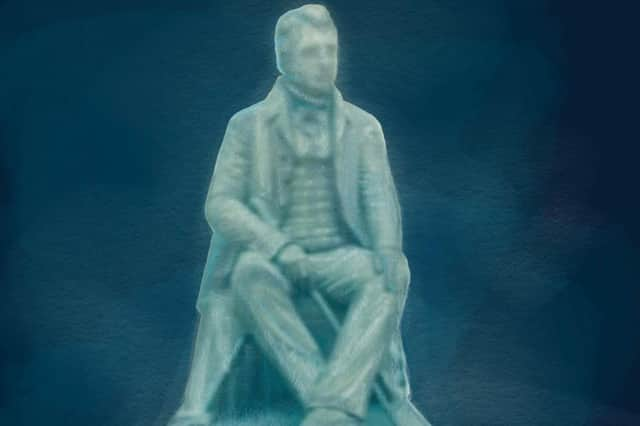Edward Kane and the Innocent Railway - Chapter 11


“And what was you doing out at this time of night anyway, you little scamp?”
Wally Johnson smirked: “I was out and and about, sir. Out and about, ye ken. There’s things ye see at night that ye never see during the day, eh?” Horse mused that this boy had perhaps seen too much in his tender years...
Advertisement
Hide Ad“Sometimes, sir, I’ll get tae watch a gentleman’s carriage if he wants to take a lady up a close – if ye ken what I mean. Sometimes, I can get a thruppeny bit, just for keeping an eye out, ye ken?”
Horse laughed and shook his head. He pointed at the boy’s boots: “What about them new boots, young fella? I wager that them didn’t come from your collection of thruppenies.”
The boy said nothing, but looked nervous now. Horse thought for a moment, then lied: “It’s alright, son. Your dad told me all about it. The money, I mean...”
This stopped the boy in his tracks. He looked startled for a moment and said nothing. Horse persisted: “I told you. It’s alright. Like I said – Jocky told me all about the money. About how the money came after your friend – what was his name, again – ‘Johnny Campbell’ – after little Johnny Campbell came off the wagon. Well – you was there, Wally – you know what happened, son...”
*****
The great Parliament Hall was dark at this hour, but the lamps had been lit and the open coal fires still had a warm orange glow.
Kane made his way towards the statue of Walter Scott, ghostly in the dark now. He could make out a figure standing nearby. It was old Mr Stevenson, the solicitor from the Johnny Campbell case.
Advertisement
Hide AdStevenson peered through the gloom, and when he identified that it was Kane approaching, he tipped his hat. Kane gave a short bow, then smiled and addressed the old solicitor: “Mr Stevenson. Good evening to you. I apologise for any delay in coming out, but you will forgive me for saying that I was not expecting consultation in Parliament Hall so late in the evening.”
Stevenson nodded: “Nor I, Mr Kane, nor I. However, I’m afraid there have been developments in the Johnny Campbell matter. They happened at the end of the business day. I immediately sent word to your lodgings, sir, but there has been no response at your door.”
Advertisement
Hide AdKane thought to himself, indeed, he had not been at home for much of the day, his tasks comprising the visit to the Innocent Railway Tunnel, attending with Dr Stanton, and then the fruitless visit to the Police Office.
Stevenson continued: “I will show you a single document, Mr Kane, and that will explain our...“predicament”, shall we call it?
Stevenson bent over, opened his briefcase on the floor and produced a sheaf of papers. He handed one of them to them to Kane. Even in the half-light of Parliament Hall in the evening, Kane immediately recognised what this was.
“An Interim Interdict. Granted today. Here in the Court of Session...”
Stevenson nodded: “Against Euphemia Campbell. As you see, it is an order prohibiting her from conducting any further investigation into the death of her child.”
“But this is outrageous....”
“And yet, it has the force of law, sir.”
Kane studied the document. The allegation was that the grieving mother had been investigating the incident in the tunnel and, in the course of that, she had been making claims that the rail operators, North British Railway Company, were responsible for the death of her son. She was now ordered to stop.
Advertisement
Hide AdKane handed back the document, thought for a moment, then asked a lawyer’s question: “And does our lady have the funds to challenge this?”
Stevenson shook his head: “She has some – if little – left. But the whole process is likely to be ruinous.”
Advertisement
Hide AdKane nodded, then: “Well, Mr Stevenson, I am happy to act for her on a speculative basis and will take no fee.”
“But I am not, sir.”
Kane was taken aback at the abrupt response from a solicitor who had been so accommodating thus far. More importantly, on a practical level, Kane – as an Advocate – was not allowed to take a case unless instructed through a solicitor. And that solicitor had just pulled the rug from under the Advocate’s feet.
The old solicitor shook his head: “Mr Kane, the issue of financial ruin aside, is it not more...more humane, sir, to let this matter wither on the vine now? Mrs Campbell has no prospect of success here. The boy was misbehaving and he paid the price, sir. You said so yourself. Let the interdict stand. Let the boy rest in peace. Let the mother start to grieve properly...”
As Kane listened to the old solicitor’s words, he heard the wisdom of many years’ practice in the Law. No doubt Stevenson was correct in his analysis of this futile, unwinnable cause.
The two lawyers stood there before the dying fire in Parliament Hall, silent for a moment, then Stevenson continued: “A copy of the Interdict was also served on my office today, Mr Kane. And it came with a request for a meeting tomorrow. The railway want to draw a line under the whole affair, as I understand it. They wish to meet with you and me...”
Kane remembered his visit to Dr Stanton today and the calling cards of the two individuals who had preceded him: “And would the parties at that consultation happen to be a ‘Mr Shepherd’ and a ‘Mr Malcolm’?”
The old solicitor could not contain his surprise: “My word, Mr Kane – how could you possibly know such a thing?”
“Oh, Mr Stevenson – let us call it an educated guess...”